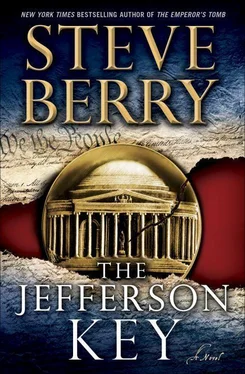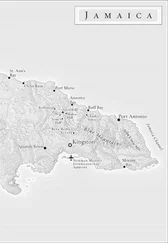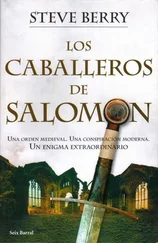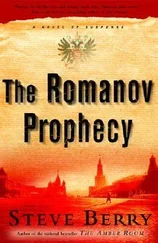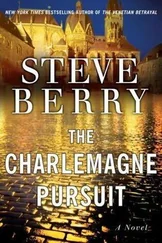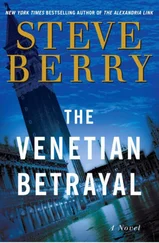Steve Berry - The Jefferson Key
Здесь есть возможность читать онлайн «Steve Berry - The Jefferson Key» весь текст электронной книги совершенно бесплатно (целиком полную версию без сокращений). В некоторых случаях можно слушать аудио, скачать через торрент в формате fb2 и присутствует краткое содержание. Жанр: Триллер, на английском языке. Описание произведения, (предисловие) а так же отзывы посетителей доступны на портале библиотеки ЛибКат.
- Название:The Jefferson Key
- Автор:
- Жанр:
- Год:неизвестен
- ISBN:нет данных
- Рейтинг книги:3 / 5. Голосов: 1
-
Избранное:Добавить в избранное
- Отзывы:
-
Ваша оценка:
- 60
- 1
- 2
- 3
- 4
- 5
The Jefferson Key: краткое содержание, описание и аннотация
Предлагаем к чтению аннотацию, описание, краткое содержание или предисловие (зависит от того, что написал сам автор книги «The Jefferson Key»). Если вы не нашли необходимую информацию о книге — напишите в комментариях, мы постараемся отыскать её.
The Jefferson Key — читать онлайн бесплатно полную книгу (весь текст) целиком
Ниже представлен текст книги, разбитый по страницам. Система сохранения места последней прочитанной страницы, позволяет с удобством читать онлайн бесплатно книгу «The Jefferson Key», без необходимости каждый раз заново искать на чём Вы остановились. Поставьте закладку, и сможете в любой момент перейти на страницу, на которой закончили чтение.
Интервал:
Закладка:
They were on their own.
Easy to see, the report had concluded, why they might play loose with the rules.
NSA stepped close. “You set Malone up, then led him straight into a trap. You knew what was going to happen there today. You wanted someone to shoot him, didn’t you? What’s the matter, Wyatt, lost your taste for killing?”
He stayed calm and asked, “Are we through?”
“Yep. You’re through,” CIA said. “Here. But since you’re not going to tell us anything, we have people who can be more successful in acquiring answers.”
He watched as they shifted on their feet, waiting for him to acknowledge their superiority. Perhaps that threat of a more intense questioning was designed to scare him. He wondered what possessed them to think that such a tactic would work. Luckily, he’d socked away enough tax-free money in foreign banks to live comfortably forever. He really needed nothing from any of these people. That was one advantage of being paid from a black-ops budget-no W-2s or 1099s.
So he debated his options.
He assumed the two men who’d brought him were just outside the door. Beyond the window, on the opposite side of the room, past the blinds, was surely a fire escape. All these older buildings possessed one.
Should he be quiet and take two down or make some noise and drop all four?
“You’re coming with us,” NSA said. “Carbonell has a lot of explaining to do and you’re going to be witness number one for the prosecution. The man who can contradict her lies.”
“And you think I would actually do that?”
“You’ll do whatever you have to do to save your hide.”
Interesting how little they knew about him.
A mechanism from deep within seized control, and he allowed it.
One swing of his body and his right fist found CIA’s throat. Then he doubled NSA over with a kick to the chest, careful for the legs not to lose their balance. While the one man fought to breathe, he pounded NSA’s neck with a short chop, breaking the man’s collapse with his arms, then gently laying the stunned man on the floor.
He then stepped behind CIA and wrapped an arm around his neck.
“I could choke you to death,” he whispered in the man’s ear.
He gritted his teeth and increased the pressure on the windpipe.
“I’d actually enjoy watching you suck your last breath.”
Tighter.
“Listen to me,” he said. “Stay. The hell. Out of my way.”
CIA reached for his arm.
He increased the hold. “Do you hear me?”
Finally, the man nodded, then a lack of oxygen sucked all resistance from the muscles.
He released his grip.
The body folded to the floor, hardly making a sound.
He checked for pulses. Faint, but there. Breathing was shallow, but constant.
He stepped to the window, opened it, and left.
MALONE WAS WAITING FOR BOTH DANIELS AND DAVIS TO EXPLAIN what was happening with Stephanie. But he also realized the president had much to say. So, since they were 30,000 feet in the air with nowhere to go, he decided to sit back and listen as Daniels explained what happened in the spring of 1835.
“Jackson was furious over the assassination attempt,” the president said. “He openly blamed Senator Poindexter from Mississippi, called the whole thing a Nullifiers’ conspiracy. He hated John Calhoun. Called him a traitor to the Union. That one I can understand.”
Calhoun had been Jackson’s vice president and, initially, a big supporter. But in the face of a rising southern sympathy, Calhoun had turned on his benefactor and started the Nullifier Party, advocating states’ rights-especially southern states’ rights. Daniels, too, had seen his share of vice-presidential traitors.
“Jackson had dealt with pirates before,” Daniels said. “Jean Lafitte in New Orleans he liked. Together they saved that city during the War of 1812.”
“Why do you call these people pirates?” Cassiopeia asked. “Were they not privateers? Specifically authorized by America to attack its enemies?”
“That they were and, if they’d stopped there, it might have been okay. Instead, once they received that letter of marque in perpetuity, they were hell on water.”
He listened as Daniels explained how during the Civil War the Commonwealth worked both sides of the conflict.
“I’ve seen classified documents from that time,” Daniels said. “Lincoln hated the Commonwealth. He planned on prosecuting them all. By then privateering was illegal, thanks to the Declaration of Paris in 1856. But here’s the rub. Only fifty-two nations signed that treaty. The United States and Spain refused.”
“So the Commonwealth kept going?” Cassiopeia said. “Using that failure to their advantage?”
Daniels nodded. “The Constitution allows for letters of marque. Since the United States never renounced privateering by signing the treaty, it was essentially legal here. And even though we didn’t sign the treaty, during the Spanish-American War both we and Spain agreed to observe the treaty’s principles. The Commonwealth, though, ignored that agreement and attacked Spanish shipping, which so angered William McKinley that he finally had Congress pass an act in 1899 making it unlawful to capture shipping or distribute any proceeds taken as a prize.”
“Which meant nothing to the Commonwealth,” Malone said. “Their letters of marque would give them immunity to that law.”
Daniels pointed a finger at him. “Now you’re beginning to see the problem.”
“Some presidents,” Davis said, “used the Commonwealth to their advantage, some fought them, most ignored them. No one, though, ever wanted the public to know that George Washington and the U.S. government had sanctioned their actions. Or that the U.S. Treasury profited from their actions. Most simply let them do as they please.”
“Which brings us back to Andrew Jackson,” Daniels said. “He’s the only one who stuck it up their ass.”
Davis reached beneath the table and found a leather satchel. He withdrew a sheet of paper and slid it over.
“That’s a letter,” the president said, “Jackson wrote to Abner Hale, who, in 1835, was one of the four in the Commonwealth. Jackson kept a copy in a cache of presidential papers that have remained sealed in the National Archives. Papers only a few can access. Edwin found it.”
“I didn’t know there was such a repository,” Malone said.
“Neither did we, until we went looking,” Daniels said. “And I’m not the first to read that. They keep a log at the archives. A lot of presidents took a look at that letter. But none in a long while. Kennedy was the last. He sent his brother Bobby for a gander.” The president pointed to the page. “As you can see, Abner Hale sent the assassin after Jackson, or at least that’s what Jackson thought.”
Malone read the page, then passed it to Cassiopeia and asked, “Abner is related to Quentin Hale?”
“Great-great-granddaddy,” Daniels said. “Quite a family tree they’ve got there.”
Malone smiled.
“Andrew Jackson,” the president said, “was so mad at the Commonwealth, he ripped the two pages from the House and Senate journals where the letters of marque had been congressionally authorized for the four families. I saw both journals myself. A jagged tear in each volume.”
“Is that why you can’t simply revoke the letters?” Cassiopeia asked.
Malone knew the answer. “No congressional record of their passage means no legal authority stating that they have to be honored. Presidents can’t sign letters of marque unless Congress okays them, and there’s no record of Congress ever approving these.”
“Presidents can’t do it on their own?” Cassiopeia asked.
Daniels shook his head. “Not according to the Constitution.”
Читать дальшеИнтервал:
Закладка:
Похожие книги на «The Jefferson Key»
Представляем Вашему вниманию похожие книги на «The Jefferson Key» списком для выбора. Мы отобрали схожую по названию и смыслу литературу в надежде предоставить читателям больше вариантов отыскать новые, интересные, ещё непрочитанные произведения.
Обсуждение, отзывы о книге «The Jefferson Key» и просто собственные мнения читателей. Оставьте ваши комментарии, напишите, что Вы думаете о произведении, его смысле или главных героях. Укажите что конкретно понравилось, а что нет, и почему Вы так считаете.
